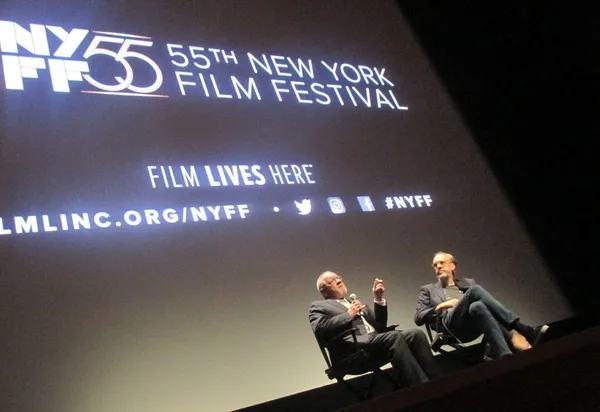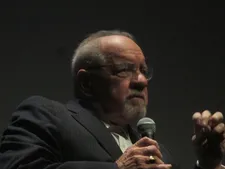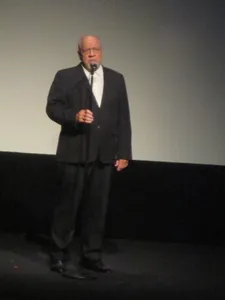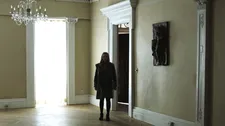 |
| Paul Schrader with Kent Jones on Martin Scorsese casting Albert Brooks in Taxi Driver: "Whenever he had a bad role, he put a comic in it." Photo: Anne-Katrin Titze |
The Film Society of Lincoln Center's New York Film Festival's added sneak preview of Paul Schrader's First Reformed as a Special Event, starring Ethan Hawke and Cedric the Entertainer with Philip Ettinger and Amanda Seyfried was presented by the director at Alice Tully Hall. Director of Programming and Selection Committee Chair Kent Jones joined Schrader on stage for a post-screening discussion.
The influence of Andrei Tarkovsky, Jean-Luc Godard, Carl Theodor Dreyer, and Ingmar Bergman, Ethan Hawke's character coming from Robert Bresson's Diary of a Country Priest, Ida director Pawel Pawlikowski's encouragement, and what Martin Scorsese's casting of Albert Brooks in Taxi Driver had to with Cedric the Entertainer being in First Reformed were confessed by Paul Schrader.
 |
| Paul Schrader on Pawel Pawlikowski: "He was explaining that with the new technology you could make a film like Ida and have it be commercially viable." Photo: Anne-Katrin Titze |
Ethan Hawke is Toller (likely named after revolutionary expressionist playwright Ernst Toller), Reverend of the First Reformed Church, a picturesque white landmark fueled by American history. He has decided to keep a journal. For 12 months he will note down everything, sitting at the table in his bare, mostly furniture-less, home adjacent to the chapel, pouring alcohol in his coffee bowl, contemplating his despair, fighting the physical and spiritual pain gnawing at him. After the year is over, the diary shall be destroyed.
One day, after his sermon, a woman named Mary (Amanda Seyfried) comes to Toller and tells him about the worries she has about her husband Michael (Philip Ettinger). She is pregnant and her husband (who is 33 years old) sees no future for our planet. Climate change, refugees, terrible weather - what will the world look like for their child? After Mary finds a suicide vest in their garage, she tells Toller about it and what is set in motion goes beyond anyone's expectations. Cedric the Entertainer, as Toller's superior in the church, has a sinister agenda of his own.
Schrader shrewdly invites us to "lean in" and contemplate truth, pride, abandonment, destruction and the casual miracle along the way in his transcendent First Reformed.
Paul Schrader: You know, before I became a screenwriter I was very interested in spiritual films. I wrote a book about the subject. But I never thought I would actually try my own hand at it. I was just too interested in psychological realism, sex, violence, things that really aren't in the spiritual tool book. When people would ask me, I said, no, I don't make films like that, I'm not interested in making films like that.
Then about two and a half years ago, I was speaking with Pawel Pawlikowski who directed the film Ida. We were talking and he was explaining that with the new technology you could make a film like Ida and have it be commercially viable. And I remember walking uptown back to my condo, thinking: It's time. You've been avoiding this film all your life. It's time to now write it. From that moment on it went rather quickly, once that decision had been made.
![Ethan Hawke as Toller: "Obviously the character comes from [Diary Of A] Country Priest."](/images/newsite/Ethan Hawke(2)_225.webp) |
| Ethan Hawke as Toller: "Obviously the character comes from [Diary Of A] Country Priest." |
Kent Jones: Did you have Ethan in mind when you were writing the screenplay?
PS: Well, it's a bad idea, of course, for writers to think about actors. Because it makes you a lazy writer. You're sitting there, you're typing out a scene and you hear Al Pacino read it - wow … So I don't think about actors when I write. But halfway through this I started thinking about Ethan. And, boy, he's just old enough now. Just on that cusp of moving from boyishness to middle age. This is maybe right for him.
After I finished the script - I just sent it to Ethan. And he responded within 24 hours. And said "Let's do this." He's in New Mexico, by the way, and wishes he could be here. You know, working actor.
On getting the audience to lean in:
PS: When you understand this kind of filming, filming that encourages the viewers to lean into the experience and because the film is made away from the viewer. Then you start thinking about withholding techniques. Where you're keeping things from the viewer that they expect. In this case it's screen size.
It also applies to music - holding the music back. Not telling them how to feel. Holding performances back. Delaying the cuts so that it doesn't cut when the viewer expects it to cut. These are all withholding techniques that try to get the viewer to come toward the film. Most films do the opposite.
They're so needy of your approval that they're like a kid on a first date and just all over you … That makes you lean back and the movie comes at you. If a movie is smart enough to lean away from you then you start to lean toward it. And that creates a much more involving dynamic.
 |
| Paul Schrader: "After I finished the script - I just sent it to Ethan." Photo: Anne-Katrin Titze |
On influences:
PS: Obviously the character [Toller] comes from [Diary Of A] Country Priest (Journal D'Un Curé De Campagne). There are other influences in there. We could actually make a 3D version of this with footnotes (he makes swishing sounds) - Godard - swish - Bresson - swish - Tarkovsky - Dreyer - and Bergman. A lot of influences are in there, a lot of term papers are going to be written about this film.
On making slow films:
PS: Somebody said to me once: "Isn't it hard to be slow because movies are so fast now?There's so much information, so many cuts, so much multi-tasking for the viewer." I said "No, it's the opposite. It's much easier to be slow now. Because you don't have to do a lot to throw the viewer off."
Because they are expecting so much information at such high speed, that all you have to do is take two steps backward and they're already thrown and you have them. So in fact it's easier to make a slow film today than it was 30 years ago.
On breaking rules:
PS: One thing that I learned studying [contemplative] films is what they all do is: make a rule, break a rule. So you make a rule and then you're the first one to break it. So you tell the audience, we're not going to do this, we're not going to do this. And then you do it! And that's how you control it. Now, there are nine camera moves in that film. One really obvious one.
And I remember we're doing a scene and I said to the cinematographer [Alexander Dynan], "Let's do this as a dolly move." He said: "We don't do dolly, we don't move, we don't pan, we don't tilt." And I said:" You know, but today just feels like a good day to break the rules." Just to tell the audience we can break a rule whenever we want.
What would Tarkovsky do?
PS: I thought somewhere toward the end of the second half, we should jump outside so the audience knows that we can jump outside. Then I started thinking of that scene where she came over. And I thought to myself, what would Tarkovsky do? And I said, well he would have her levitate … When in doubt, let them levitate. So that's what I did.
 |
| Amanda Seyfried as Mary in First Reformed |
On contemporary films going into the transcendental territory:
PS: Silent Light (directed by Carlos Reygadas) of course is terrific, a remake of Ordet. Stations of the Cross, Dietrich Brüggemann is the name of the director, a German film. And there are a couple others.
In April next year, University of California Press they're going to do a new edition of that book [Transcendental Style In Film] for which I worked three years writing a long new section which covers 1972 to the present. From Tarkovsky to Slow Cinema and what happened to that idea that I proposed in 1972. It was quite a bit of work because there are a lot of slow films out there. They're making them faster than we can see them.
Kent Jones: Do you think Tarkovsky would have worked with Cedric the Entertainer?
PS: I don't know. People of faith are so two-dimensionally slagged in movies. I thought how do I keep this character from just being a bad guy? You put, you know, Pat Robertson in there … And I thought, maybe I should put a comic in.
Something I learned from Scorsese years ago. Whenever he had a bad role, he put a comic in it. He put Albert Brooks in Taxi Driver. He said to me what am I going to do, it's a terrible role? Of course, put a comic in it. A comic will make it work. I did the same thing. I put a comic in there but said, you know, you can't be funny. But of course, he will be ingratiating because that is his nature.
The 2017 New York Film Festival runs through October 15.





















